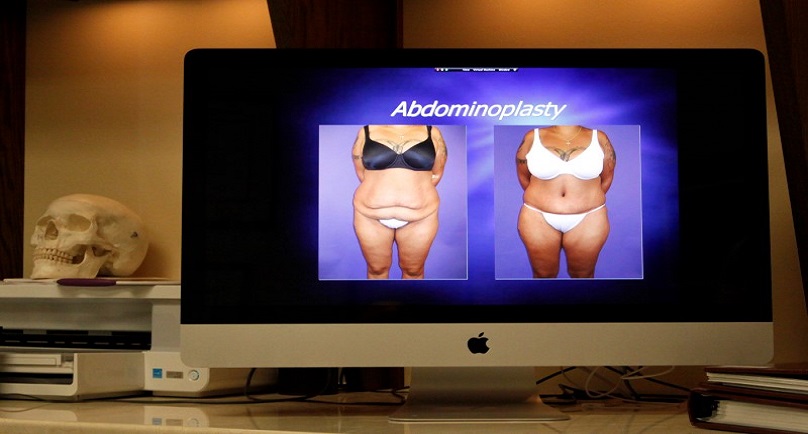Image: A computer screen shows before and after photos of an abdominoplasty patient after the patient had massive weight loss due to bariatric surgery seen in the offices of cosmetic surgeons REUTERS/Rick Wilking
![]()
By Kathryn Doyle
Reuters News – Although use of drugs to treat diabetes and other diseases related to obesity may decline after weight-loss surgery, use of neurological and psychiatric drugs may rise sharply, suggests a new study.
Based on thousands of patients in Denmark, researchers found that three years after gastric bypass surgery, patients’ prescription drug use in general decreased, including blood sugar and cholesterol control drugs. But use of antidepressants and neuropathy drugs more than doubled.
It isn’t clear why neuropsychiatric drug use rises after weight-loss surgery, but the reasons should be explored, the study team writes in Annals of Surgery.
“It is well-known that weight loss induced by gastric bypass may improve e.g. type 2 diabetes and other metabolic diseases,” lead author Dr. Sigrid Bjerge Gribsholt of Aarhus University Hospital told Reuters News by email.
“But it is surprising that this improvement in metabolic diseases resulted in so pronounced reduction in medication for these diseases – such as more than 70 percent reduced use of drugs used for treatment of diabetes, 40 percent reduction for antihypertensive drugs, and 50 percent reduction for drugs against hyperlipidemia,” Gribsholt said.
The researchers studied data from a group of more than 9,000 patients who underwent Roux-en-Y gastric bypass surgery in Denmark between 2006 and 2010 and compared them to more than 99,000 similar people in the general population who did not have the surgery. Based on medical records, the researchers compared prescription drug use six months before surgery and three years after the procedure.
Most surgery patients were women and an average of 40 years old when the study began. About 80 percent of those getting gastric bypass were taking a prescription drug at the beginning of the study period compared to 50 percent of those not getting the surgery.
Three years later, gastric bypass patients were using fewer prescriptions while those in the comparison group were using more.
In the bypass group, use of blood sugar-lowering drugs, cholesterol drugs, blood pressure drugs and inhalers for obstructed airways all decreased substantially.
But even before undergoing surgery, use of neuropsychiatric drugs like antidepressants and antipsychotics was twice as high in the gastric bypass group relative to the others, and rose further after surgery.
“This indicates that bariatric surgery may not on the average have beneficial effect on psychological issues or psychiatric conditions,” Gribsholt said.
Diabetes, high blood pressure and unhealthy cholesterol are closely related to profound obesity and are therefore cured in many patients after surgery, she said.
“Right now there is no other procedure, drug, regimen, anything, that seems to be effective for allowing people who have already gained weight to lose it and keep it off,” said Pierre Cremieux, Managing Principal of Analysis Group, Inc., an economic, financial, and strategy consulting firm in Boston, who was not part of the new study.
“The picture is pretty dire, and so far at least bariatric surgery seems to be the only intervention that works but of course, it is a fairly radical and irreversible decision for a patient,” Cremieux told Reuters News.
The new study involved many patients over the long term and yielded reliable results, but the situation in Denmark may not be applicable to other countries, he said. Previous studies had found that antidepressant and antipsychotic use stayed steady after bariatric surgery, while use of other drugs decreased.
“There may be less psychiatric treatment in Denmark,” he said. When patients interact with the healthcare system for bariatric surgery, they may also be referred for mental health treatment that they weren’t receiving before.
Drug use may reflect changes in underlying diseases and patients are generally informed that the use of drugs to treat diabetes often can be reduced immediately after the operation, Gribsholt said. “On the other hand, obesity surgery is not a cure for everything – for example, psychological problems or pain may still be present – or even arise – after surgery, necessitating medical treatment,” she said.
“In the U.S. there have been real efforts particularly at centers for excellence to make sure that there is a very careful mental health dimension to bariatric surgery processes,” Cremieux said.
SOURCE: http://bit.ly/1U2ldEO Annals of Surgery, online April 2, 2016.
Copyright 2016 Thomson Reuters. Click for Restrictions.


